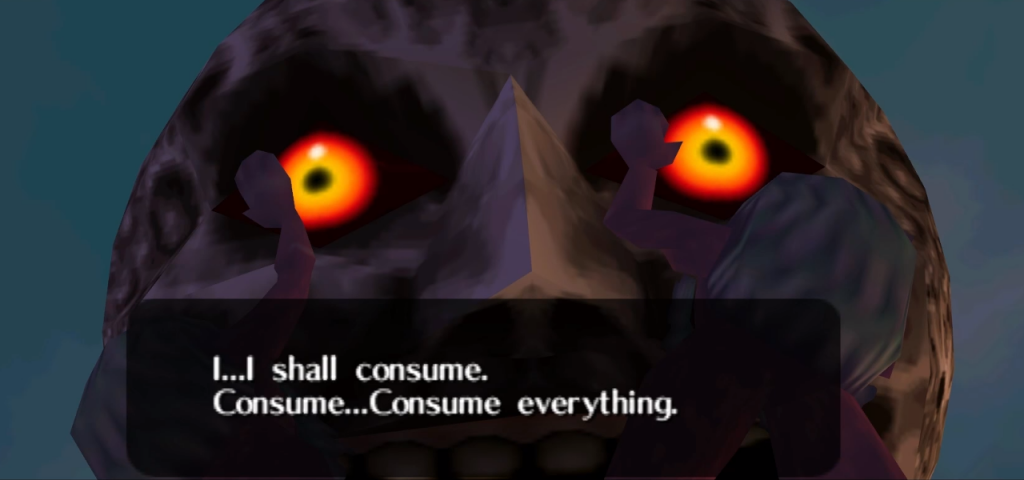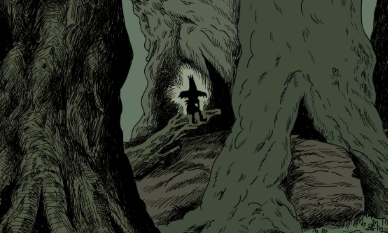Consume Everything: Our Empathy For Villains Who Seek Control
Posted on May 29 2021 by Andrew Gray

Spoilers ahead for Majora’s Mask and Twilight Princess!
“I shall consume… Consume everything.”
Majora speaks these words after Link foils its attempt at crashing The Moon down into Termina. The Moon begins to siphon the world below into its gullet with such force that it causes the Giants to tremor under its power. Unless Majora can be stopped, it seems that the entire world will be sucked into the evil Moon.
This moment can shock the player for many reasons, but it was my own reaction to it that surprised me. I felt a strange sense of empathy for this statement, this desire to “consume everything.” I could relate to this feeling, and not just when I was very hungry. Maybe it’s because I first beat this game when I was an angst-filled preteen, but that statement hit me hard.
Control as a Means of Coping

Have you ever had a thought that life would be better if you ruled the world? Somedays when you struggle to get along with your peers, when your family misunderstands your intentions, or when the larger forces that be push you in a way you don’t want to go, does the thought ever occur to you that you may be happier if you ruled the world?
It’s a perfectly natural response to the feeling that you have been treated poorly. To put it simply: when we feel an unpleasant emotion, we realize that if we could be in control of what caused the emotion, we could then end the unpleasantness. I think this past year of quarantine is a testament to this feeling. We want control over the situation so that we can end the suffering.
To consume everything is another means of seizing control, because destruction also gives us power back. If we can destroy the source of pain, we will be free of it. If I consume the entire world, there would be nothing left to hurt me. To me, the desire to control and to destroy are two sides of the same coin, each stemming from the need to regain power and to end pain.
Understanding why we seek to control or destroy helps us understand why some of us may empathize with those who are supposed to be the bad guys. Taking over the land by force or threatening to destroy the world is of course a bad thing, but then why do I still find myself relating to the villains of our games? Is it bad to think Zant is cool, or to wish I was Ganondorf sometimes? I believe empathy for our villains is perfectly understandable. Their exhibition of the relationship between the desire for control and the desire for protection grounds them.
Skull Kid
Let’s start by looking back at who is ultimately not even a villain, but still decides to use destruction as a means of self-protection. Skull Kid was friends with the four Giants, but when they vowed to protect the land of Termina, they had to leave Skull Kid behind. Abandoned by his friends, he felt hurt and wanted to get back at the land that took away his friends, so he began to cause trouble around Termina. The people, so frustrated by Skull Kid, called upon the Giants to stop the shenanigans. The Giants were angered by their former friend and cast him out of Termina, threatening to kill him if he returned. This is the mental damage Skull Kid lives with before the events of the game even take place.
Rejected by his friends and his calls for help ignored (for what else would causing all that trouble really accomplish if not to signal he is upset), Skull Kid was entirely alone. Tatl and Tael found him and managed to provide him some comfort, but his pain was still deep within him. When he takes the power of Majora’s Mask, he is given the opportunity to destroy that which causes him pain. After being abandoned and rejected and left entirely on his own he has a chance to remove from the world that which causes him pain.
If you were in his situation, would you do the same?
Zant
 Zant is another villain who is more than meets the eye. My fellow ZD writer Charles recently analyzed Zant, but allow me to summarize my own thoughts on the King of Shadow. In his first appearances, he is a calm and calculating villain who has complete control over himself and his domain. However, under this mask is revealed to be a ravenous victim of his own oppressed emotions. He reveals that he is one of the few Twili to have any emotions at all, but by order of his royal family he must repress them. Without expression, his repressed feelings build up and create the madness that plagues him. Zant suffers because he was born with feelings in a world that does not understand them.
Zant is another villain who is more than meets the eye. My fellow ZD writer Charles recently analyzed Zant, but allow me to summarize my own thoughts on the King of Shadow. In his first appearances, he is a calm and calculating villain who has complete control over himself and his domain. However, under this mask is revealed to be a ravenous victim of his own oppressed emotions. He reveals that he is one of the few Twili to have any emotions at all, but by order of his royal family he must repress them. Without expression, his repressed feelings build up and create the madness that plagues him. Zant suffers because he was born with feelings in a world that does not understand them.
Have you felt this way yourself? Perhaps on late nights, you reflect on your inner-most feelings that are tucked away from the outside world (or, perhaps that is just me…).
It is understandable, then, that someone who was psychologically controlled all of their life would have a strong desire to take back that control. Misguidedly, Zant chooses not to seek liberation through the expression of his emotions, but instead by taking control of both the realms of light and shadow. When he is in charge of this realm, no rules can bind him to madness anymore.
Understanding Zant as a victim of his own society, his assault on the Twili people and turning them into Shadow Beasts begins to make more sense. It is not the seemingly random oppression by a dictator; it is a deliberate attack on the people who drove him mad. The attack on the realm of light makes more sense too, because of his envy towards those who are free to enjoy the light he has been denied.
Understanding Zant in this way also helps us see why he would worship Ganondorf in such an obsessive and devoted way: the Gerudo King is the only creature he has met that allows him to feel in any capacity. Years of emotions that were denied and rejected are finally allowed to rise to the surface, and the well of Zant’s emotions begins to overflow. Imagine such a release! A lifetime of oppression freed by a powerful stranger who also promises you exactly what you have wished for. Zant’s devotion to Ganondorf is less about Ganondorf and more about his opportunity to escape the psychological prison he has inhabited for his entire life.
At its core, Zant’s struggle is to take control of his own life away from those who have held it over his head. This struggle is viscerally human, and opens the door for us to project our own struggles onto his. When we see Zant marching with his army on the halls to usurp Midna, we may see ourselves fighting to take back what we believe is rightfully ours.
Ganondorf
In fact, I think we can relate to Ganondorf himself, as his relative blank slate allows us to project our own desires for control onto him. Ganondorf’s motivations vary from game to game, but can be essentially boiled down to him wanting to rule the world. With no analysis of character or motivations, let us examine the simplest evil motivation: the desire to take over the world. What would you change if you ruled the world? What would you make better? Would you be happier in this world? If you were given the chance to seize the Triforce of Power and to conquer the planet with its strength, would you?
Perhaps it is the megalomaniac in me, but I would be surprised if someone denied this opportunity. The opportunity is to make things better for ourselves, and it is entirely human to wish we had this opportunity sometimes. When we are without power, we wish for power. We see Ganondorf’s quest to seize all the power, we relate for our own desires to be with power. It is as simple as that.
The Blood Moon Rises Once Again…

The Blood Moon itself is a symbol of this cycle of control. When we feel our power weakening in the world, we lash out and attempt to regain it. Maybe we dye our hair a new color, or get a new job, or move to a different city. Whatever way we choose, the Blood Moon rising in our mind is our call to regain control over our own lives. Just like Ganon revitalizing his minions, we are attempting to regain control.
So before the next mental Blood Moon rises, I encourage you to find the ways you have control over your own life and celebrate them. No matter what power you feel you may have or lack, it is ultimately you who can choose who you want to be, what you do with you life, and how to use the gift of your autonomy. There is no need to control the external world if you can become the master of your internal domains, and I hope all of you find comfort in the control you have over yourself.
Is my psychoanalysis of villains and gamers on to something, or am I full of malarkey? Let me know in the comments down below!
Andrew Gray (he/him/his) is a writer who enjoys writing, The Legend of Zelda, and the fact that you are reading this tag line right now.




